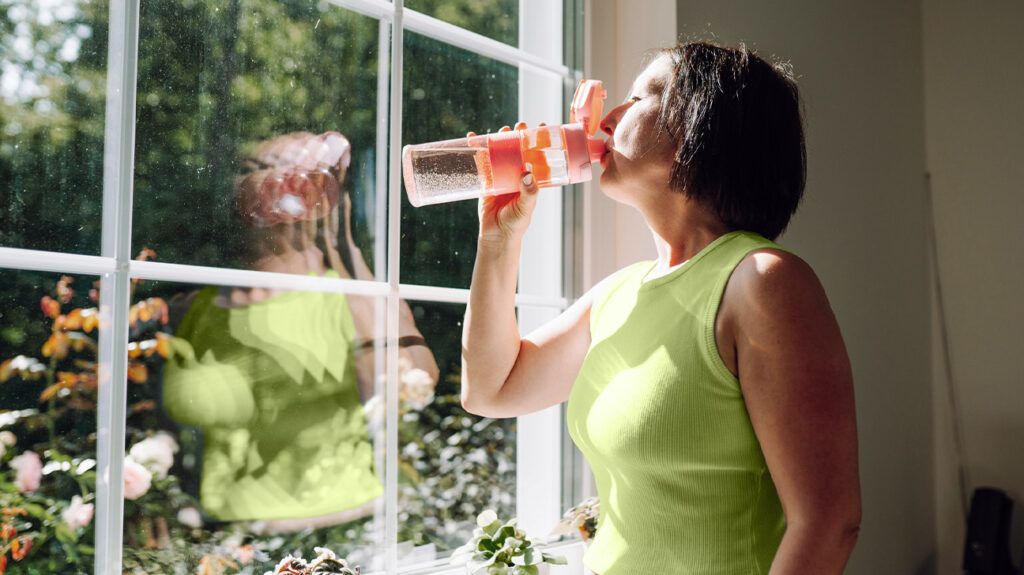Frequent diarrhea is a common symptom of ulcerative colitis (UC). Remaining hydrated is important for someone with UC because frequent diarrhea can lead to dehydration, a potentially serious health condition.
UC is an autoimmune disorder that causes inflammation in the lining of the large intestine, or colon. Common symptoms of UC include abdominal pain, bloody stool, and diarrhea.
Dehydration occurs when the body loses more water or fluid than it takes in. People living with UC have an increased risk of dehydration.
This article covers the importance of staying hydrated if a person has UC. It also looks at what causes dehydration in those with UC and tips on staying hydrated.

Staying hydrated by getting enough water every day is important for overall health. Every cell, tissue, and organ in the body needs water to function properly.
Water plays many crucial roles in the body,
- regulating body temperature
- lubricating joints
- protecting the spinal cord
- removing waste from the body
Taking in less water than the body loses causes dehydration, which can eventually lead to a number of complications, such as heat injury, seizures, kidney problems, and low blood volume.
People with UC need to drink plenty of water because they can lose fluid through frequent diarrhea.
Frequent diarrhea can also cause the body to
Those with UC need to replace potassium, as a
There are many ways to take in more electrolytes. Sports drinks contain adequate amounts, but a person might prefer to purchase electrolyte powder and mix it into water.
The inflammatory nature of UC prevents the intestinal lining from absorbing enough fluids and nutrients to keep the body healthy.
Instead of undergoing absorption, water leaves the body as watery, runny stools. People with severe UC may have
Those with UC may develop dehydration if they do not take in enough water and electrolytes to replace those lost in bowel movements.
A person with UC is
A
Other factors that can increase the risk of dehydration include sweating profusely due to heat or exercise and drinking coffee or alcohol. Coffee and alcohol can cause dehydration by encouraging the body to release extra fluids.
It is also important to limit or avoid carbonated drinks such as soda. Like coffee and alcohol, these can act as diuretics.
In addition, a
Thirst is one of the main signals that dehydration has developed.
Other symptoms of dehydration include:
- not urinating as often
- tiredness
- dark urine
- dry mouth
- a lack of energy
Severe dehydration can cause:
- muscle cramps
- pale skin
- dizziness
- sunken eyes
- fast breathing
- confusion
- a high pulse
Anyone with symptoms of moderate to severe dehydration should receive medical care, as severe dehydration
The simplest way to stay hydrated is to drink plenty of water — at least 1.2 liters a day — preferably with electrolytes. This works out to be about six 200-milliliter (mL) glasses or eight 150 mL glasses a day.
Having urine that is light yellow or clear is a suitable indication of adequate hydration. Darker urine is a sign of dehydration.
Drinking the recommended amount of water should not increase the frequency of bowel movements for people with UC.
Carrying a refillable water bottle may make staying hydrated more convenient. Individuals also need to drink more water on hot days and during exercise, especially if they are outside.
Water and sports drinks are not the only options for staying hydrated. Fruits and vegetables
- watermelon
- oranges
- apples
People with UC can contact a healthcare professional if they have any questions about hydration.
The following are answers to common questions about UC and hydration.
What is the best juice to drink with ulcerative colitis?
There is no definitive research determining the best juice for ulcerative colitis. However, a person can try drinking juices that contain high levels of antioxidants, which
Juices that may benefit individuals with ulcerative colitis include apple juice, cranberry juice, orange juice, and purple carrot juice.
Learn more about the best juices for ulcerative colitis.
Is Gatorade OK for ulcerative colitis?
Gatordate is OK to drink if a person has ulcerative colitis. It contains electrolytes that can help to prevent dehydration.
What drinks are bad for ulcerative colitis?
A person with ulcerative colitis needs to avoid or limit drinks that increase the risk of dehydration, such as caffeinated or alcoholic beverages.
Learn more about dehydrating drinks.
Diarrhea is one symptom of UC and can cause dehydration. The best way to replace lost fluids and prevent dehydration is to drink plenty of water and beverages containing electrolytes.
In severe cases, dehydration can be life threatening, and anyone with symptoms needs emergency medical care.
A healthcare professional can describe the best ways to manage diarrhea. It is easier to stay hydrated when a person addresses their diarrhea.
